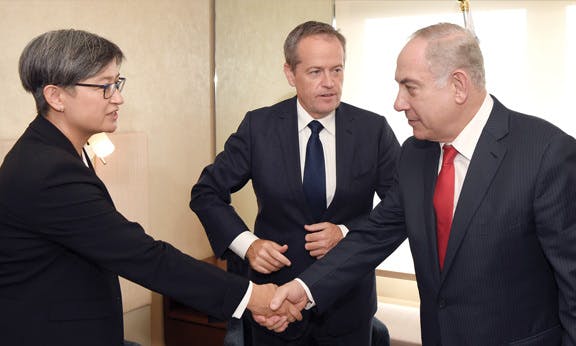Is Labor about to abandon Israel?

A resolution expected to pass at the NSW Labor state conference in late July, urging “the next Labor government to recognise Palestine” has been touted as a dramatic shift in Labor policy by the pro-Israel Murdoch press. “Labor will formally abandon almost 40 years of explicit ideological support for Israel”, according to the Australian’s national political editor Simon Benson.
Last month, the Tasmanian ALP state conference called on the next federal ALP government to “immediately recognise the state of Palestine” and Labor’s Queensland conference, also in late July, is expected to pass a similarly worded resolution. These resolutions follow public calls by former Labor prime ministers Bob Hawke and Kevin Rudd and former foreign ministers Gareth Evans and Bob Carr for diplomatic recognition of a Palestinian state.
All of these Labor stalwarts were die-hard Israel supporters during the heyday of their parliamentary careers. Hawke and Carr established Labor Friends of Israel back in 1977. Hawke remained steadfastly defensive of Israel even while the apartheid state brutally suppressed a popular uprising against its illegal occupation of the West Bank and Gaza Strip during the 1980s (the first Intifada). During the 2007 federal election campaign, Kevin Rudd claimed he had Israel “in his DNA”. Two years later, his deputy Julia Gillard defended Israel’s bombardment of the defenceless and blockaded civilian population of Gaza, claiming Israel “had a right to defend itself”.
What is behind this apparent conversion? Is Labor now dumping decades of support for apartheid Israel in favour of an independent and viable Palestinian state?
The Palestinian Authority (PA) and its predecessor, the Palestine Liberation Organisation (PLO), have conducted a long campaign to secure diplomatic recognition from the United Nations and its member states. Currently, 137 nations recognise Palestine, including eight EU members. The EU adopted a position of support for recognition of Palestinian statehood in 2014.
The EU and its members have given the PA more than €10 billion in aid since it was established in 1994 following the signing of the Oslo Accords between Israel and the PLO. US aid to Palestinians has averaged $400m a year over the last decade. However, such aid not only relieves Israel – the occupying power – of its obligations. It also serves to reinforce the occupation through the policy of “security coordination”.
Under the Oslo Accords, the PA is obliged to share information with Israel about armed resistance to the occupation. This policy has been deemed “sacred” by the PA’s chief Mahmoud Abbas, who claims the title of Palestinian president 13 years after being elected to a four-year term. The Abbas-led PA spends US$1 billion annually on security. PA security officers, who make up half of PA civil servants, are increasingly despised by Palestinians for their role in detaining anti-occupation activists and passing on information to Israeli occupation forces.
“It is very clear we have the Palestinian security services collaborating with the Shabak – the internal Israeli security service”, Shawan Jabarin, head of the Ramallah-based Al-Haq human rights organisation, told Al Jazeera last March.
“This type of coordination does not provide security to the Palestinians; rather, it is used against them. It is lethal, dangerous, and should be terminated”, he said.
Today the PA is a vital pillar in maintaining the status quo in occupied Palestine. Its call for “statehood” amounts to little more than the authority of a municipal government, while Israel continues to expropriate Palestinian land for settlements, routinely bombs Gaza, and controls the occupied Palestinian territories’ land borders, water supplies, seas and airspace.
Like the UN Security Council condemnation of illegal Israel settlement building in the West Bank, Palestinian “statehood” serves a largely symbolic purpose. The mantra of a “two-state solution” in which two nations – Israel and Palestine – live behind “safe and secure” borders remains the official policy of both the ALP and the Liberals, as well as the governments of Israel’s closest allies, the US, Canada, Britain and France. Yet to most Palestinians, it remains a pipe dream. It also fails to address the needs of Palestinians living inside Israel under conditions of apartheid, as well as millions of Palestinian refugees who are denied the right to return to their homeland.
The need to be seen to be doing something to limit the worst excesses of Israeli barbarism is no doubt influencing a growing number of Labor politicians, especially given the intransigence of Israeli prime minister Benjamin Netanyahu to take any meaningful steps to allow Palestinians to govern themselves.
The gulf between bipartisan support for Israel and Australian public opinion has never been so large. A Roy Morgan poll conducted last March found that 61 percent of Australians condemn illegal Israeli settlement building, 73 percent favour diplomatic recognition of Palestine by the Australian government and 55 percent consider the call for a boycott of companies who profit from the Israeli occupation as “reasonable”.
A shift in Labor policy towards recognition of Palestine is a pragmatic step. It would place an incoming Labor government more in sync with a growing number of Western governments that are prepared to criticise Israel while continuing to support a “two-state solution”.
However, it falls well short of abandoning support for Israel. If Labor wants to offer tangible support for Palestinian liberation it should back the Palestinians’ decade-long call for boycotts, divestment and sanctions directed at Israel to force the apartheid state to end its occupation and discrimination against Palestinians once and for all.